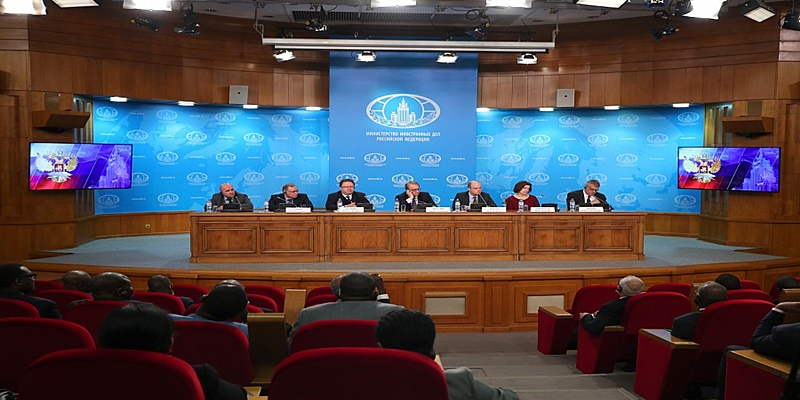Russia Meets African Envoys on Russia-Ukraine Crisis

Russian diplomats at the Foreign Ministry have been stepping efforts to get first-hand blistering information on the Russia-Ukraine crisis, its primary causes and implications to African governments.
On February 24, Russian President Vladimir Putin announced a special military operation, after both the Federation Council and the State Duma (legislative chambers) approved the implementation of the presidential decision that has since sparked debates throughout the world. It has also pushed for the United States and Canada, European Union members and many other external countries to impose sanctions against Russia.
Long before the special military operation aimed at “demilitarization and denazification” in the former Soviet republic of Ukraine, there has been fabricated or true information about Russia’s intentions to use the power of social media. As seen in practice, Western and European media have strong operational networks throughout Africa.
The Russian Foreign Ministry is worried about anti-Russia publications, policy propaganda and information in some African media outlets. Obviously, Russian media is extremely weak on the African continent. Consequently, local African media replicate information from western sources.
While Russian diplomats claim to have a common understanding, expressions of solidarity and trust with African friends on global issues, the African Union, Regional Economic Organizations and African governments are still divided over the Russia-Ukraine crisis.
African leaders still believe that all countries have to respect and operate within the confines of international law. The circumstances demand peaceful settling of disputes in a manner that does not undermine international peace, security and justice. All countries must be guided profoundly by the principles of non-interference in internal matters, respect for national sovereignty and territorial integrity.
The Russian Foreign Ministry must use the diplomatic channels to send down the official situational truth about the Russia-Ukraine crisis to various African governments. This is necessary for geopolitical reasons.
On March 10 and 22, the Special Representative of the President of the Russian Federation for the Middle East and Africa, Deputy Minister of Foreign Affairs of Russia Mikhail Bogdanov, held special briefings for the heads of diplomatic missions of the African and Arab countries accredited in the Russian Federation. It was fully devoted to the situation in Ukraine. The diplomats were informed the reasons, goals and objectives of the ongoing special military operation, including those to ensure the demilitarization and denazification of Ukraine, protect the long-suffering people of Donbass, and eliminate the threat to Russia’s national security emanating from Ukrainian territory. There were also significant issues related to ensuring the security of the civilian population in Ukraine, the organization and operation of humanitarian corridors, and the provision of assistance to refugees.
The Foreign Ministry further explained questions relating with requests for assistance in providing safe exit (evacuations), including their citizens, from crisis-ridden Ukraine. During the meetings, questions from African diplomats about the activities of embassies in Moscow under the conditions of illegitimate sanctions imposed by Western, European and other countries on the Russian Federation were answered.
In addition to these special briefings, Deputy Minister Bogdanov held bilateral discussions with Ambassadors from Benin, Djibouti, Egypt, Libya, Nigeria, Somalia, South Africa and Tanzania. Interesting to recall here that at the UN on March 2, Nigeria and Egypt were among the 28 African countries that voted to condemn Russia.
On March 22, Deputy Minister of Foreign Affairs of the Russian Federation Sergey Vershinin also held meetings with representatives of African states in the UN Security Council – Ambassador of the Gabonese Republic to the Russian Federation, Johanna Rose Mamiaka; Ambassador of the Republic of Ghana to the Russian Federation, Oheneba Dr. Lesley Akyaa Opoku-Ware and Ambassador of the Republic of Kenya in the Russian Federation, Benson Ogutu.
Topical issues of Russia’s interaction with the African “troika” in the UN Security Council were discussed, including the humanitarian situation in Ukraine, the state of affairs in Libya, Somalia, and the reform of the Security Council. Minister Bogdanov reaffirmed Russia’s long-term intention to strengthen and develop traditionally friendly ties with African states.
Earlier on February 28, Bogdanov received Ambassador of the Republic of South Africa, Mzuvukile Jeff Maketuka, and exchanged messages on the occasion of the 30th anniversary of the establishment of diplomatic relations between Russia and South Africa. During the conversation, both discussed the strengthening of mutual cooperation in the trade, economy, science and humanitarian spheres.
South Africa was one of the 17 African nations that abstained during the UN resolution demanding that Russia immediately withdraw from Ukraine. It took a similar stance during Putin’s annexation of Crimea in 2014. South African President Cyril Ramaphosa has come under fierce criticisms over the official stand on Russia-Ukraine crisis.
Russia has indicated strong preparedness and high interest to broaden cooperation in trade and in the economic sectors in Africa. Alongside plans to open trade missions in a number of African countries as well as explore opportunities offered by the African Continental Free Trade Area (AfCFTA), Moscow is planning for the second Russia-African summit.
By Kester Kenn Klomegah
The author writes frequently on Russia, Africa and the BRICS.
